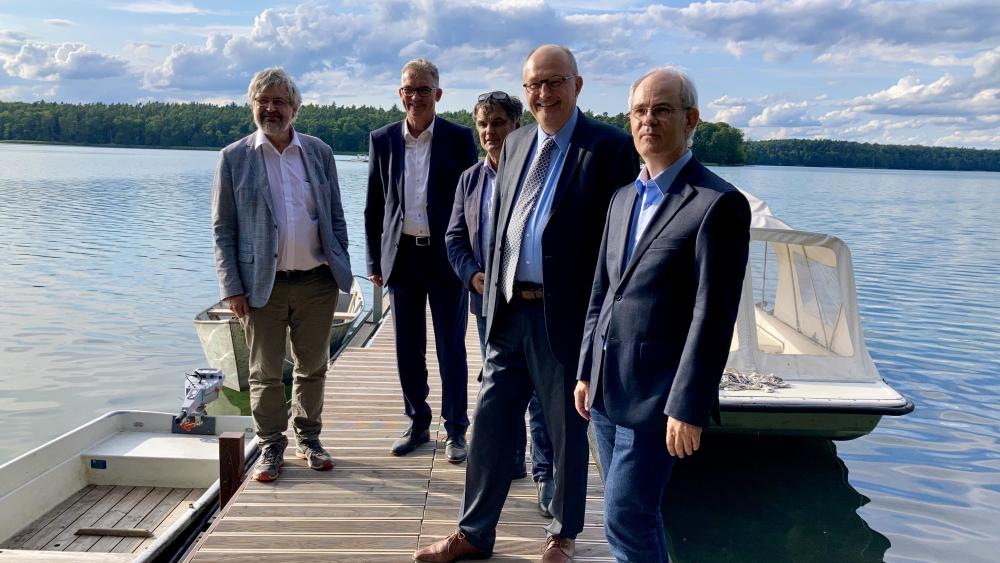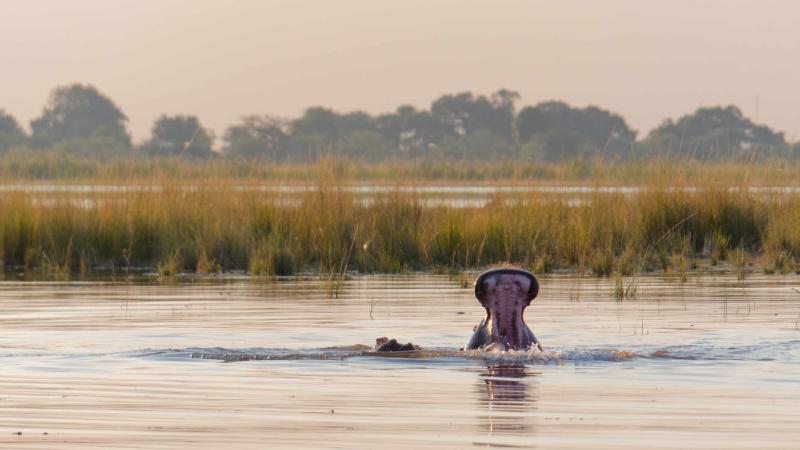
Various stakeholders join forces: the group that came together to find out on the ground how the state of Lake Stechlin could be improved included Brandenburg’s Minister of the Environment Axel Vogel, State Secretary Uwe Feiler, Head of Office Frank Stege and State Secretary Dr. Michael Meister, speaking to IGB scientist Professor Dr. Mark Gessner (from left to right). | Photo: Angelina Tittmann
At the very beginning of the meeting, State Secretary Dr. Michael Meister asked the two key questions: How does phosphorus enter the lake, and what technical solutions are available to solve the problem? IGB’s Professor Dr. Mark Gessner, who has been undertaking research at the lake for ten years, explained the current data and assessed the different options for action. In the process, he drew attention to the central problem: the high levels of phosphorus promote algal growth in the lake. Besides limiting the depth of visibility, the algae result in an accumulation of carbon and phosphorus in the sediment after sinking to the bottom of the lake. Microorganisms then break down this biomass, releasing phosphorus and depleting oxygen. This oxygen depletion leads again to the release of even more phosphorus – a vicious circle that must be broken. After all, when there is no oxygen left in the deep water of the lake, this habitat is no longer able to sustain fish and other creatures.
The Stechlin cisco has little air left
The Stechlin cisco (Coregonus fontanae), which only occurs in Lake Stechlin, is particularly endangered. IGB vehemently highlighted this issue last year, when there were fears that the oxygen-free zones in the deep and cool waters of Lake Stechlin would expand to such an extent that the habitat for this fish species would disappear altogether. The weather conditions in the spring of 2020 and 2021 prevented the situation from deteriorating – at least for the time being. Nevertheless, the scientists on the ground are urging caution. They recommend preparing hypolimnetic aeration so that action can be taken swiftly and specifically if needed, knowing full well that it would merely be a case of combating symptoms.
Phosphorus precipitation could help the lake in the long term
Phosphorus remains the central problem. According to IGB researchers’ current assessment, phosphorus precipitation is therefore the method of choice for reducing elevated concentrations in the lake. Although this technical solution has been tried and tested in principle, its application is complex in the case of lakes as deep and large as Lake Stechlin. It also represents an intervention in the lake. The benefits, risks, and probability of success must therefore be considered and weighed very carefully. The next step should therefore be a feasibility study, which is being prepared by the Lake Stechlin working group that has been launched especially by the Ministry of Agriculture, Environment and Climate Protection (MLUK). In addition to general technical and financial concerns, it must now be clarified which precipitation agents are appropriate, which should be excluded, whether precipitation can take place in the lake or outside it, and which flanking measures would be expedient.
At the same time, efforts will be stepped up to identify the cause of the problem, because it is not known what triggered these processes in the lake in the first place. Climate change could play a role, as could the impact of the nuclear power plant in Rheinsberg, which ceased operation in 1990, or the decline of aquatic plants, which has also been observed in other lakes.
IGB advises policymakers and society as a whole
However, the research issues at stake do not justify postponing the restoration of the lake. It therefore remains a question of social and environmental ethics as to which measures politicians, authorities and civil society will agree on. Although IGB supports this process, the organisation is not an environmental policy stakeholder, which was reiterated at the meeting. IGB provides objective advice to politicians, authorities, business and civil society on the basis of its own scientific findings and data, and the current state of research. The institute’s core tasks do not include drawing up expert opinions or playing a leading role in the planning and implementation of feasibility studies or restoration measures.








